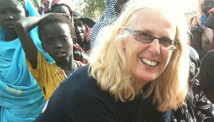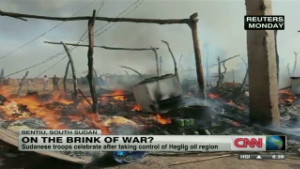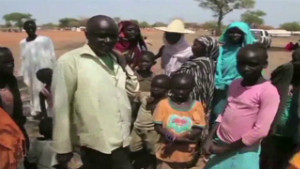Opinion: World must step in to avert South Sudan crisis
April 25, 2012 -- Updated 1506 GMT (2306 HKT)
Editor's note:
Editor's note: Pauline Ballaman heads Oxfam's emergency response in the
Jamam refugee camp in South Sudan. The world's newest nation was
created in July 2011 when it declared independence from Sudan: now the
two nations are in conflict. Nearly 37,000 refugees have fled to the
camp since late last year, escaping the ongoing conflict in Sudan's
Blue Nile state, with more expected as the fighting spreads along the
border. More than 100,000 refugees from the bloodshed and the parallel
conflict in Southern Kordofan are now in South Sudan and Ethiopia.
Hundreds of thousands more have been internally displaced within Sudan.
Jamam refugee camp, South Sudan (CNN) -- The dried up cattle pond is only a few meters off the red road that runs through Jamam refugee camp. It's a huge hole in the ground, long emptied by the blazing sun. At the bottom of this pit women and children dig with cups and bowls in the smelly, spongy mud for the little dirty water that seeps into their shallow wells.
Jamam refugee camp is in
a desperate situation. All day Oxfam trucks water from the very few
working boreholes in or near the camp to tanks close to the road. Women
wait in the heat for up to four hours twice a day, next to their long
queues of buckets and jerry cans. Men with sticks and whips police the
lines. Fights break out all the time. No one has to ask why. There is
simply not enough water and we are running out of options and we are
running out of time.
This is the daily
struggle that is the human face of peace failing in the Sudans. The
conflict in Blue Nile has been going on for months, and now in the past
few weeks fighting between Sudan and South Sudan threatens to further
destabilize the wider border region these refugees still live in.
Like a cruel reminder of
the conflict that the refugees fled, unidentified Antonovs -- the kind
of planes that bombed their villages in Blue Nile -- flew over Jamam
camp three times in the past few weeks. In a panic, refugees ran and
sought safety in holes in the ground.
To truly understand why
peace is so important, the world needs to remember it's not just the
fighting that matters but also the enormous suffering it causes those
who have already been forced to flee it. The interrupted lives,
deadened by displacement in the hot, unblinking heat. In barely
established camps like Jamam there's nothing to do but wait.
In Jamam -- where water
is rationed well below people's needs, enough only for cooking and
bathing - that struggle has become a crisis that is about to deepen as
the rainy season approaches.
How to get enough water?
That is the burning question, but the ground here has few answers.
There is just not enough water to cope with so many new people -- and
now there are fears that more may arrive as conflict spreads. We've
done a hydro-geological survey and we've drilled for new boreholes. We
have even resorted to water divining -- a traditional method using
metal rods in the hope of detecting ground water. Only one drill has
produced any water, but very little.
We were completely
reliant on four overworked boreholes pumping 22 hours a day. One of
these collapsed last week, and now there are just three. Rationing has
been tightened again. It was a grim evening in our base in the camp
that night. We ate our meal to the loud hum of the generator with our
hearts in our stomachs.
The refugees were
settled here partly because the host community was welcoming. But as
water sources run out or dry up and more and more refugees arrive,
competition for water is beginning to cause conflict here too. Fights
break out at water points. The pressure is intense and I fear it will
get worse.
The heavy rains are
coming, bringing fresh problems. It rained last week for three hours,
long enough to destroy many of the flimsy shelters of plastic sheeting,
sheets, or straw the refugees have constructed under trees. Whole
families were left exposed.
The rains will flood
large parts of the camp, bringing the threat of disease and making
trucking water in very difficult -- perhaps impossible as the roads
deteriorate into impassable mud slicks. Drilling in the rains is also
near impossible.
It is hard to express
how miserable the mud of Upper Nile is. It's a kind of black clay that
sticks to everything, the stuff of quagmires. Largely impermeable,
water sits on top of it, a massive health risk not just encouraging
malaria but also water-borne diseases including cholera.
Humanitarian agencies
working in the camp are looking into options including relocating a
large number of the refugees to a new site, and putting in a pipeline
that will hopefully mean the water can reach the camp more reliably
when the roads fall apart.
But there's only one real solution. People need peace and people need to be able to go home.
Unless all parties
involved in the fighting stop and focus on long-term peace then I fear
that the situation in Sudan and South Sudan will reverse to how it was
during wartime, Africa's longest civil war, the most recent phase of
which lasted 22 years and left around 2 million people dead.
All that progress made
in the years following the 2005 peace agreement risks being lost. The
international community played a major role in brokering that peace --
now is the time to make sure it lasts. The people in Jamam, and across
the two countries, deserve to be free from the constant threat of
crisis.

Oxfam's Pauline Ballman works in the Jamam Refugee Camp in South Sudan.

